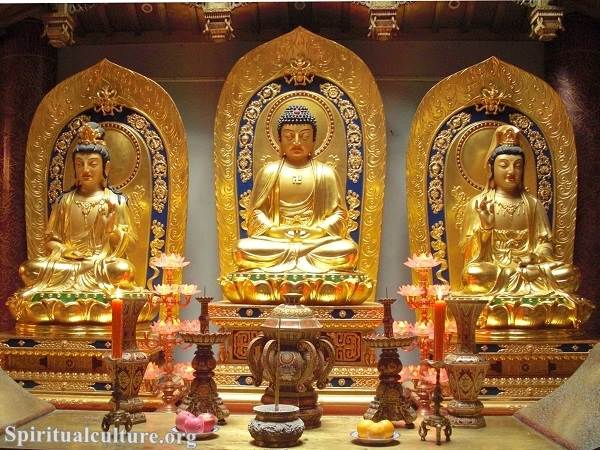Pure Land Buddhism is a form of Mahayana Buddhism that emphasizes the role of Amitabha Buddha and his Pure Land, known as the Western Paradise or Sukhavati, in the path to enlightenment. According to Pure Land teachings, Amitabha, who is believed to have made a vow to save all sentient beings, created the Pure Land as a place where practitioners can be reborn and receive teachings from him and other buddhas in order to achieve spiritual progress and ultimately attain full enlightenment.
Practitioners of Pure Land Buddhism focus on the recitation of Amitabha’s name, known as the “Nembutsu,” which is believed to bring about the aspiration for rebirth in the Pure Land and to purify negative karma. This practice is considered to be an easy and efficient path to enlightenment for people with busy lives and limited abilities to practice other forms of Buddhism.
Pure Land Buddhism is particularly popular in East Asian countries such as China, Japan, and Korea, where it has been practiced for centuries. In Japan, for example, Pure Land Buddhism became one of the most popular forms of Buddhism during the Kamakura period (1185-1333) and continues to be a major influence in Japanese Buddhism today.

In addition to the recitation of Amitabha’s name, Pure Land Buddhism also includes other practices such as visualization of the Pure Land and its inhabitants, the reading of sutras and commentaries, and the study of the teachings of Pure Land masters.
Pure Land Buddhism also emphasizes the concept of “other-power” in contrast to the “self-power” emphasized in other forms of Buddhism. The idea of “other-power” refers to the belief that it is through the grace and power of Amitabha and his Pure Land, rather than through one’s own efforts, that one can attain rebirth in the Pure Land and achieve enlightenment. This emphasis on the power of Amitabha and the Pure Land, along with the simplicity of the practice of reciting Amitabha’s name, has made Pure Land Buddhism particularly appealing to laypeople and those who may have difficulty with more complex practices.
Another important aspect of Pure Land Buddhism is the emphasis on the compassionate nature of Amitabha Buddha. According to Pure Land teachings, Amitabha is a deeply compassionate Buddha towards all sentient beings and is dedicated to helping them attain enlightenment. This emphasis on the compassion of Amitabha is seen as a source of comfort and inspiration for practitioners, who can take comfort in the idea that they are being guided and helped by a being who cares deeply for their well-being.
In addition to the traditional Pure Land practices, many different Pure Land communities and organizations worldwide provide support and guidance for practitioners. These communities often organize recitation sessions, retreats, and other events to help practitioners deepen their understanding and practice of Pure Land Buddhism.
In summary, Pure Land Buddhism is a form of Mahayana Buddhism that emphasizes the role of Amitabha Buddha, his Pure Land, and the recitation of Amitabha’s name to achieve spiritual progress and enlightenment. It is particularly popular in East Asian countries like China, Japan, and Korea. It emphasizes the concept of other power, the compassion of Amitabha, and the support of Pure Land communities for practitioners.
